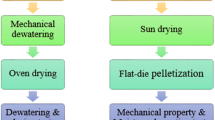Abstract
Due to its morphological composition which includes mostly combustible material (plastics, paper, textiles, etc.), municipal solid waste is potentially a valuable raw material for use in power generation. On the other hand, content of incombustible fraction (glass, metal, rocks, etc.) reduces its value, particularly when solid municipal waste must be processed into the form of granulate as in case of co-combustion with coal in pulverized-fuel or fluidized-bed boilers. The process of granulation reduces also the costs of logistics processes such as transport, storage and handling. That is why the research carried out in the framework of “EkoRDF—an innovative manufacturing technology of alternative fuel from municipal waste for power and heating plants—a key component of the Polish waste management system” financed by Polish Centre for Research and Development (GEKON Programme) aimed at determining the MSW potential not only in terms of use in power generation, but mainly from the point of view of technologies of converting the waste into granulated fuels for power generation units. The test material comprised oversize and undersize fractions of municipal solid waste obtained from four sources (sorting plants). The morphological and grain-size analyses were carried out, and the parameters important from the point of view of power generation were determined (moisture content, calorific value, volatile matter content, ash content). The impact of those parameters on key stages of RDF production from waste (drying, comminution and granulation) were analysed. The analysis led to determination of acceptable raw material parameters for use in production of fuel granulates dedicated to burning in power generation units.
Access this chapter
Tax calculation will be finalised at checkout
Purchases are for personal use only
Similar content being viewed by others
References
Environment DG: European Commission, Refuse derived fuel, current practices and perspectives. Final Report, CO5087-4, July 2003
Szpadt, R.: Problemy gospodarki odpadami komunalnymi ulegajacymi biodegradacji. Politechnika Wroclawska, Instytut Inzynierii Ochrony Srodowiska (2012)
Directive 2008/98/EC of the European Parliament and of the Council of 19 November 2008 on waste and repealing certain Directives
Council Directive 99/31/EC of 26 April 1999 on the landfill of waste
Abeliotis, K., Kalogeropoulos, A., Lasaridi, K.: Life cycle assessment of the MBT plant in Ano Liossia, Athens, Greece. Waste Manag. 32, 213–219 (2012)
Binner, E.: Mechanical biological pre-treatment of residual waste in Austria. In: Proceedings of the International Symposium on Sustainable Waste Management, University of Dundee, Scotland, UK, pp. 213–224 (2003)
Dębicka, M., Zygadło, M., Latosinska, J.: Investigations of bio-drying process of municipal solid waste. Ecol. Chem. Eng. A 20 (2013)
Dias, N., Belo, N., Máximo, A., Carvalho, M.T.: Recovery of glass contained in the heavy residual fraction of Portuguese mechanical biological treatment plants. J. Clean. Prod. 79, 271–275 (2014)
Garg, A., Smith, R., Hill, D., Longhurst, P., Pollard, S., Simms, N.: An integrated appraisal of energy recovery options in the United Kingdom using solid recovered fuel derived from municipal solid waste. Waste Manag. 29, 2289–2297 (2009)
PN-EN 15415-1:2011 Solid Recovered Fuels—Determination of Particle Size Distribution—Part 1: Screen Method for Small Dimension Particles. European Committee for Standardization
PN-EN 15415-2:2012 Solid Recovered Fuels—Determination of Particle Size Distribution—Part 2: Maximum Projected Length Method (manual) for Large Dimension Particles. European Committee for Standardization
PN-EN ISO 17828:2016-02 Solid Biofuels—Determination of Bulk Density. European Committee for Standardization
CEN/TS 15414-1:2010 Solid Recovered Fuels—Determination of Moisture Content Using the Oven Dry Method—Part 1: Determination of Total Moisture by a Reference Method. European Committee for Standardization
PN-EN 15413:2011 Solid Recovered Fuels—Methods for the Preparation of the Test Sample from the Laboratory Sample. European Committee for Standardization
PN-EN 15414-3:2011 Solid Recovered Fuels—Determination of Moisture Content Using the Oven Dry Method—Part 3: Moisture in General Analysis Sample. European Committee for Standardization
PN-EN 15403:2011 Solid Recovered Fuels—Determination of Ash Content. European Committee for Standardization
PN-EN 15402:2011 Solid Recovered Fuels—Determination of the Content of Volatile Matter. European Committee for Standardization
PN-EN 15400:2011 Solid Recovered Fuels—Determination of Calorific Value. European Committee for Standardization
Acknowledgements
This research are financed by Polish Centre for Research and Development and National Fund for Environmental Protection and Water Management under the GEKON Programme—project No: GEKON2/05/268002/17/2015. “EkoRDF—an innovative manufacturing technology of alternative fuel from municipal waste for power and heating plants—a key component of the Polish waste management system”.
Author information
Authors and Affiliations
Corresponding author
Editor information
Editors and Affiliations
Rights and permissions
Copyright information
© 2018 Springer International Publishing AG
About this paper
Cite this paper
Jewiarz, M., Frączek, J., Mudryk, K., Wróbel, M., Dziedzic, K. (2018). Analysis of MSW Potential in Terms of Processing into Granulated Fuels for Power Generation. In: Mudryk, K., Werle, S. (eds) Renewable Energy Sources: Engineering, Technology, Innovation. Springer Proceedings in Energy. Springer, Cham. https://doi.org/10.1007/978-3-319-72371-6_65
Download citation
DOI: https://doi.org/10.1007/978-3-319-72371-6_65
Published:
Publisher Name: Springer, Cham
Print ISBN: 978-3-319-72370-9
Online ISBN: 978-3-319-72371-6
eBook Packages: EnergyEnergy (R0)




